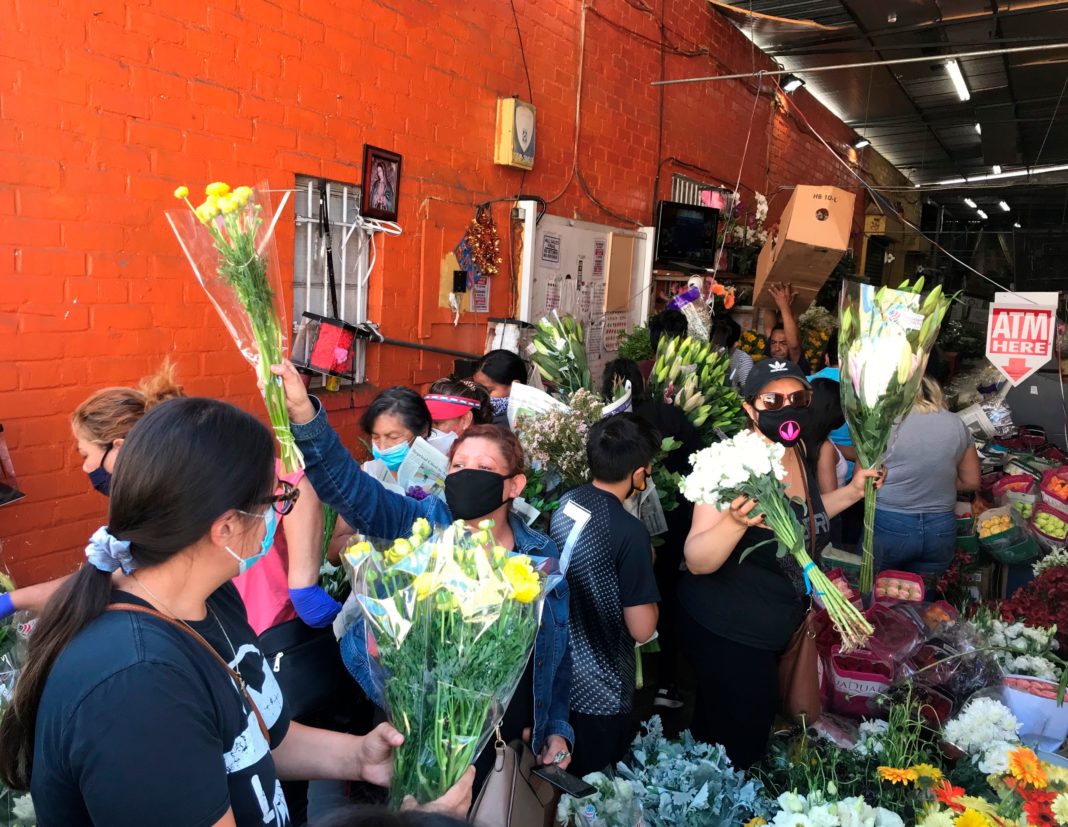The reopening of businesses like the Los Angeles Flower Market caused a multitude of shoppers to forget the social estrangement
After eight weeks of confinement, non-essential businesses in California reopened their doors today in search of the “mana” of sales prior to Mother's Day, which is celebrated this Sunday, and in some cases the emotion was such that crowds of shoppers gathered and social distancing was a pipe dream.
“Pásele, pásele, pásele” was the muffled cry of José Sánchez, a Hispanic who, wearing a half-mask, invited passers-by to visit a narrow corridor in the Flower market of The Angels, that from the first hours of this Friday was crowded.
The emotion of this small businessman was not for less.
Since last March 19, when the state governor Gavin newsom He ordered to stay home and close non-essential businesses to control the outbreak of COVID-19, this more than six-year-old flower market in downtown Los Angeles, temporarily ceased operations.
The news that this market was included among the non-essential businesses that could operate again today, together with bookstores, clothing stores and toy stores, among others, It was a great relief to hundreds of Latino merchants who have their stalls in this traditional location., knowing that May, when Mother's Day is celebrated, is a month of great sales.
Desperate to sell
"We cannot lose these days of sale, the mother's party is one of the most important for us, and if we keep these flowers we sink more than we are," said Sánchez.
The same objective of taking advantage of the celebration of May 10 has José Alvarado, owner of a wholesale flower business and who ensures that this industry represents millions of dollars for the city.
"We knew that a lot of people were going to come because owners of small florists come, those who sell flowers in the corners, and normal customers who come to retailers to look for better prices," he explained.
No social distancing
The businessmen's biggest concern is that even though the locals had notices for people to take turns entering, shoppers ignored it and social distancing guidelines to control coronavirus infections were not followed.

"It is that everything is full, even the sidewalks where you walk, so I better go quickly and leave because I am afraid of that disease," said María Luisa, a buyer who did not want to give her last name.
In this sense, Sánchez says that it is very difficult to impose order, but stresses that Most customers at least have face masks.
"To the mothers who come with the children, I say that they better leave them out here and we take care of them," warns the immigrant from Mexico, who has been working in this sector for 15 years.
According to data from the Southern California Flower Market, the week before Mother's Day represents between 25% and 30% of the annual sales of this Market.
As part of the established guidelines, the state government asked businesses to develop contactless payment procedures, have hand sanitizers for employees and customers, ensure workers have appropriate protective equipment, and ask employees to deliver products to customers' cars when possible.
Alvarado believes that it is very difficult for small Hispanic businesses to adapt to all of these rules. "They do what they can, it is not for disobeying," he explains.
The next ones that will open
The flower industry is so important these days that Newsom made his daily conference this Friday from a small Sacramento florist, The state capital.
The Democrat said that next week will give the guidelines to go to phase three, in which it will be allowed to open to beauty salons, gyms, shopping centers and even churches.
As on other occasions, the governor did not give a specific date and stressed that everything depends on scientific data.
According to the California Department of Health, as of this Thursday the state had 60,614 confirmed cases of COVID-19, of which 2,504 died and 3,319 are hospitalized.
The majority of cases are recorded by Los Angeles County, with more than 29,500 cases and 1,420 deaths.
By Ana Milena Varón






